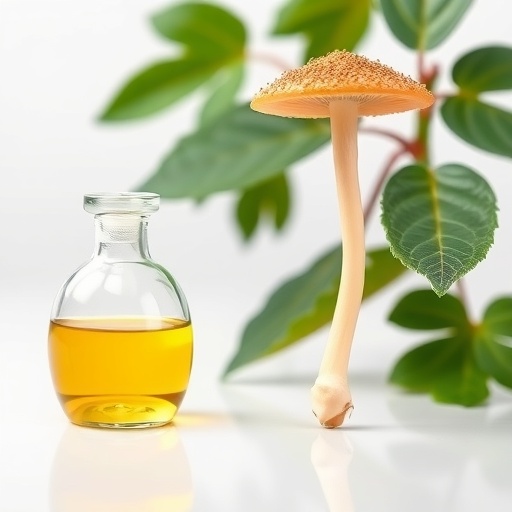In a groundbreaking study published in the journal Discover Plants, researchers have delved into the intricate world of essential oils derived from Zingiber zerumbet, unveiling a trove of bioactive compounds with promising antifungal properties against rice pathogens. This research not only highlights the potential of these natural products but also illustrates an innovative approach to combatting one of the most significant threats to global rice production: fungal infections.
Zingiber zerumbet, commonly known as shampoo ginger, is a tropical plant native to the Pacific Islands. It is known for its fragrant flowers and the aromatic sap found in its rhizomes. Harvesting these rhizomes for essential oil extraction has made this species a focal point for scientists investigating its phytochemical properties. This study specifically aimed to isolate and characterize the bioactive compounds that are responsible for the observed antifungal activity.
The method of isolation employed in this research was steam distillation, a common technique used for extracting essential oils. This technique locks in the volatile compounds while ensuring that their chemical integrity is maintained. Subsequent analysis through gas chromatography-mass spectrometry (GC-MS) allowed the researchers to identify and quantify the various phytochemicals present in the essential oil. This meticulous process not only ensured high yield but also the purity of the active compounds for further testing.
The antifungal potential of the isolated compounds was determined by subjecting them to various rice pathogen strains, including Fusarium and Rhizoctonia species, which are notorious for causing blight and root rot in rice plants. The in vitro assessments revealed that several compounds exhibited significant antifungal activity. This discovery marks a pivotal step forward in the search for eco-friendly plant protection methods that could replace synthetic fungicides, which often come with detrimental environmental consequences.
Equally important was the derivatization process that researchers undertook. By chemically modifying the identified bioactive compounds, the study sought to enhance their antifungal efficacy. Derivatization can alter the solubility, stability, and bioavailability of the compounds, potentially leading to more effective formulations against plant pathogens. This innovative approach could pave the way for the development of new antifungal agents derived from natural sources.
The implications of these findings extend beyond basic research. As rice is a staple food for more than half of the world’s population, effective management of fungal diseases is critical. By harnessing the power of bioactive compounds from Zingiber zerumbet, the agricultural sector may develop more sustainable plant protection strategies that align with organic farming practices. This aligns with a broader shift towards reducing reliance on chemical inputs in agriculture.
Moreover, the researchers have pointed out the economic advantages that could be realized by utilizing these natural antifungal agents. Reducing losses attributed to fungal infections could significantly enhance rice yields, thus benefiting farmers and improving food security in regions heavily dependent on rice cultivation. This economic angle is crucial for garnering support from stakeholders in the agricultural industry.
The study’s findings also lend credence to the broader movement advocating for the exploration of ethnobotanical resources. Many plants have been utilized in traditional medicine for centuries, yet their potential as agricultural inputs has not been fully tapped. The rigorous scientific evaluation of such plants can lead to the rediscovery of time-tested natural solutions to contemporary agricultural challenges.
In addition, Zingiber zerumbet’s profile extends beyond its antifungal properties. Previous research has indicated that this plant possesses anti-inflammatory and antioxidant activities, suggesting a multifaceted potential for products derived from it. Future research could explore these additional benefits, creating a menu of options for plant-based biopesticides that support sustainable agricultural practices.
The methodological rigor displayed in this study underscores the importance of comprehensive research practices in the field of phytochemistry. By employing advanced analytical techniques and ensuring thorough testing, researchers not only affirm the validity of their findings but also inspire confidence in the potential applications of their work. This model of integrating traditional knowledge with scientific inquiry sets a precedent for future research endeavors.
Furthermore, teamwork and interdisciplinary collaboration were vital components of this research. The diverse expertise of the authors, encompassing chemistry, agriculture, and plant sciences, illustrates the importance of a collaborative approach in tackling multifaceted problems such as agricultural pathogens. Strengthening these interdisciplinary networks will be crucial for future innovations in sustainable agriculture.
As the world grapples with the dual crises of food insecurity and environmental degradation, identifying novel solutions through research like this study becomes imperative. The path forward lies in harnessing the natural world’s resources, and Zingiber zerumbet stands out as a shining example of what can be accomplished through dedication, rigorous research, and a commitment to sustainability.
In conclusion, the research reveals a promising route for increasing the resilience of rice against devastating fungal infections through the isolation and enhancement of bioactive compounds from Zingiber zerumbet. As scientists continue to explore the vast array of natural products, this study serves as a reminder that nature often holds the keys to solving some of humanity’s most pressing issues, especially in agriculture.
Subject of Research: Antifungal activity of bioactive compounds from Zingiber zerumbet essential oil.
Article Title: Isolation and derivatization of bioactive compounds from zingiber zerumbet essential oil with antifungal activity against rice pathogens.
Article References:
Kaur, N., Kaur, R., Bhardwaj, U. et al. Isolation and derivatization of bioactive compounds from zingiber zerumbet essential oil with antifungal activity against rice pathogens.
Discov. Plants 2, 249 (2025). https://doi.org/10.1007/s44372-025-00321-1
Image Credits: AI Generated
DOI: 10.1007/s44372-025-00321-1
Keywords: Zingiber zerumbet, essential oil, bioactive compounds, antifungal activity, rice pathogens, sustainable agriculture.
Tags: antifungal compounds in Zingiber zerumbetbioactive compounds against rice pathogenscombating fungal threats to rice productionessential oils from tropical plantsgas chromatography-mass spectrometry analysisinnovative approaches to fungal infectionsisolation of bioactive phytochemicalsnatural products for agriculturephytochemical properties of shampoo gingerresearch on Zingiber zerumbet benefitssteam distillation for essential oil extractionsustainable agriculture and plant extracts





